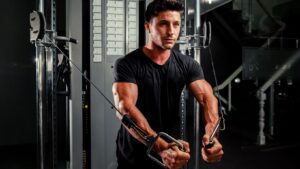In the realm of wellness, there’s no denying the crucial role a health and fitness coach plays. They’re more than just trainers; they’re the guiding force that helps individuals transform their lives. With expertise in nutrition, exercise, and behavior modification, health and fitness coaches are the powerhouses of the wellness industry.
Navigating the world of health and fitness can be daunting, but with the right coach, it’s a journey worth taking. They’re the catalysts that ignite the spark of change, helping people achieve their health goals and maintain them. So, let’s delve deeper into the world of health and fitness coaching, and discover what it truly means to have a coach by your side.
Health and Fitness Coach
 A health and fitness coach’s primary role lies in merging scientific evidence with everyday lifestyle habits. There are plenty of health-related research findings, but applying them to daily life proves challenging for most individuals, causing a disconnect. Health and fitness coaches exhibit a knack for creating a bridge between these two entities. They transform complex scientific principles into simple, attainable lifestyle modifications.
A health and fitness coach’s primary role lies in merging scientific evidence with everyday lifestyle habits. There are plenty of health-related research findings, but applying them to daily life proves challenging for most individuals, causing a disconnect. Health and fitness coaches exhibit a knack for creating a bridge between these two entities. They transform complex scientific principles into simple, attainable lifestyle modifications.
Consider a recent study by The American Journal of Clinical Nutrition, which claims that consuming five servings of fruits and vegetables a day leads to longer life spans. Rather than reading and forgetting the study, clients under a health and fitness coach’s guidance incorporate the advice into their everyday routine, by substitution or addition, until it becomes second nature. Hence, the role of a health and fitness coach becomes instrumental in making individuals realize, say for example, the impact of nutrition on their well-being, and handholding them through the journey of transforming their mundane habits into healthful ones.
Tailoring Wellness Plans for Individual Needs
Every person’s body responds differently to diets and exercises, which makes tailor-made wellness plans crucial. Health and fitness coaches comprehend this fact and design accordingly. They assess individual health conditions, understand personal goals, and craft a unique wellness plan that suits an individual’s specific needs and preferences.
For instance, a person recovering from a knee injury requires a different fitness regime compared to someone training for a marathon, even if their age and body mass index are identical. A health and fitness coach molds the workout routine accordingly: low impact workouts for the former and endurance training for the latter.
Similarly, nutritional needs differ, too. Someone with a gluten allergy will have a distinct dietary plan from an individual with no dietary restrictions. A health and fitness coach considers these nuances while providing nutritional advice. It’s the coach’s customized strategies that promote effective, sustainable changes, encapsulating the essence of holistic wellness.
Qualifications and Training of a Professional Coach
Health and fitness coaches hold an instrumental role in molding wellness, therefore rigorous qualifications and training are essential aspects of their profession. This section will delve into the educational and certification processes required to guide individuals towards their health goals.
Education Requirements
Embarking on a career as a professional coach begins with education. It’s not uncommon for aspiring coaches to hold bachelor’s degrees in fields like exercise science, physical education, or nutrition. However, it’s important to note that university degrees aren’t the only path to becoming a health and fitness coach. Many professionals acquire the necessary knowledge through various accredited courses and programs. For instance, the American Council on Exercise (ACE) and the National Academy of Sports Medicine (NASM) offer comprehensive programs that encompass topics such as kinesiology, nutrition, and behavioral psychology. These programs provide the foundational knowledge needed in the coaching profession.
Certification Processes
 Once the required educational base is achieved, pursuing certification serves as the next step on a coach’s journey. Multiple established organizations offer recognized coaching certifications. For example, the International Coach Federation (ICF), the Institute for Professional Excellence in Coaching, and Precor offer specialized coaching certifications. Obtaining certification typically involves passing a comprehensive examination that assesses a coach’s competency and understanding in health and fitness concepts. Moreover, bringing ongoing relevance, most certifications require professionals to engage in continuing education units (CEUs) ensuring their knowledge is up-to-date and they are abreast of emerging trends and research in wellness coaching. As a result, certified coaches are more equipped to provide educated, informed, and competent guidance to their clients.
Once the required educational base is achieved, pursuing certification serves as the next step on a coach’s journey. Multiple established organizations offer recognized coaching certifications. For example, the International Coach Federation (ICF), the Institute for Professional Excellence in Coaching, and Precor offer specialized coaching certifications. Obtaining certification typically involves passing a comprehensive examination that assesses a coach’s competency and understanding in health and fitness concepts. Moreover, bringing ongoing relevance, most certifications require professionals to engage in continuing education units (CEUs) ensuring their knowledge is up-to-date and they are abreast of emerging trends and research in wellness coaching. As a result, certified coaches are more equipped to provide educated, informed, and competent guidance to their clients.
By adhering to stringent educational and certification protocols, health and fitness coaches guarantee they equip themselves with the necessary knowledge, skills, and credibility. Consequently, they are better positioned to bridge the gap between scientific research and daily habits, transforming complex wellness principles into manageable lifestyle modifications for their clients.

